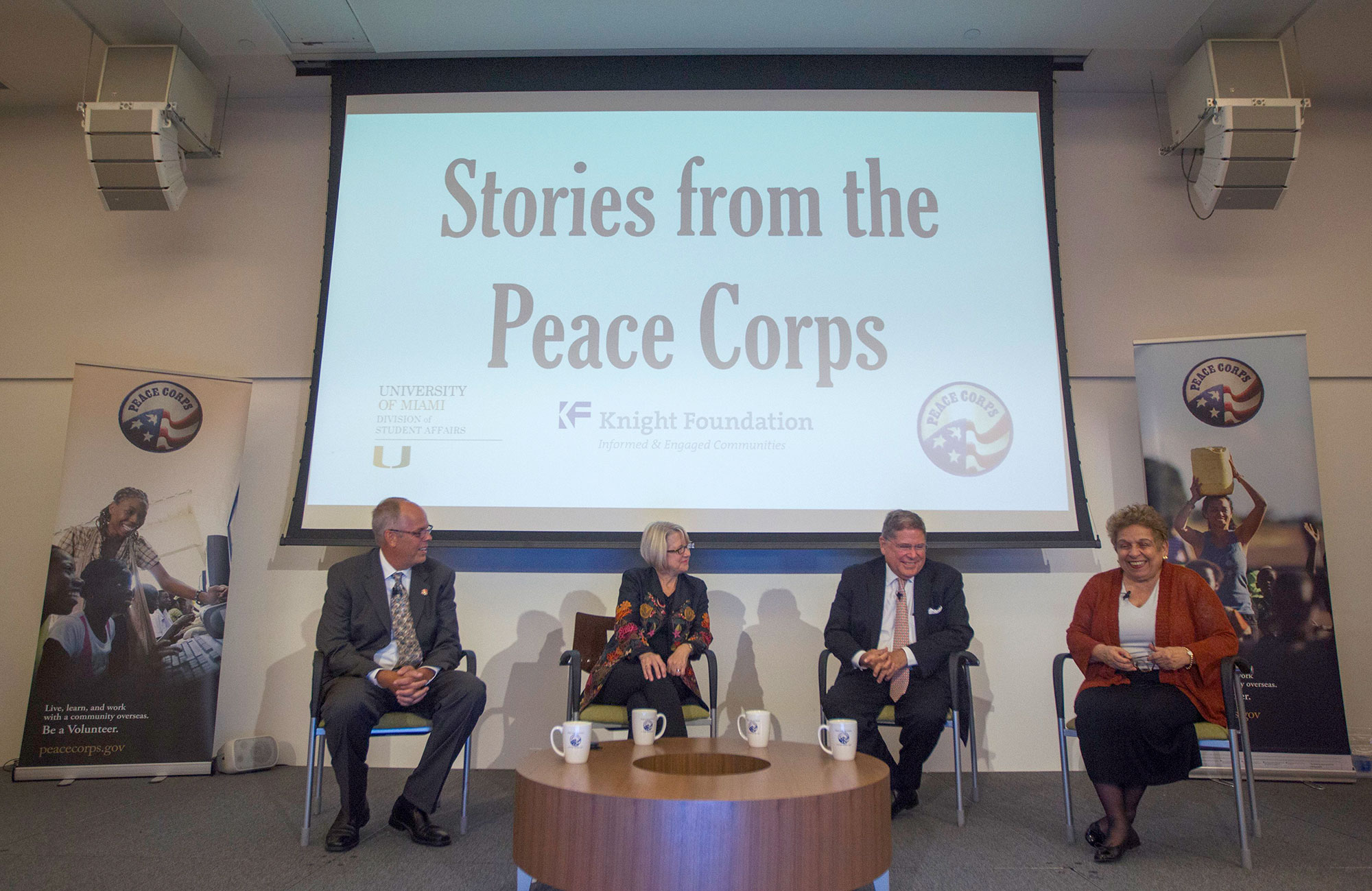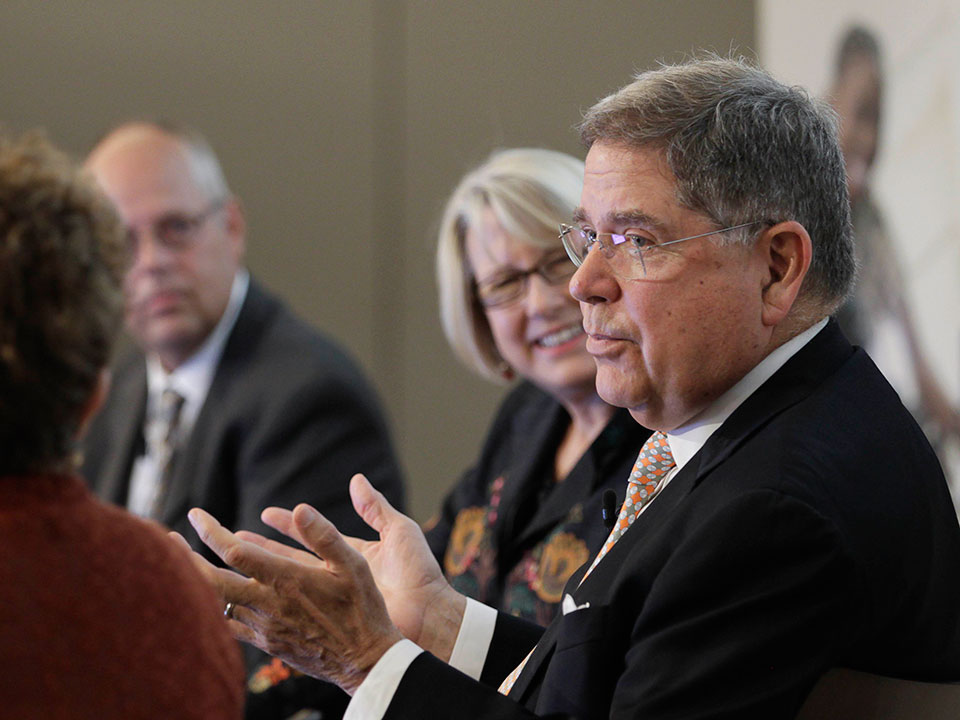
Listen first: Life lessons from the Peace Corps
At the “Stories From the Peace Corps” discussion at the University of Miami Wednesday, there were poignant moments and laughter; tales of mullahs and mud bricks in Iran; river merchants and a moustache in Venezuela and a birth in a village in Western Samoa. Together, they provided snapshots of ordinary people having extraordinary encounters. And as University of Miami President Donna Shalala, Knight Foundation President Alberto Ibargüen and Peace Corps Director Carrie Hessler-Radelet, all returned Peace Corps volunteers, told their stories, they also spoke of how those experiences shaped their lives.
“If you pay attention to what’s going on around you and shut up and listen, you are likely to learn a lot yourself,” said Ibargüen, who served stints in Venezuela (1966-68) and Colombia (1969-71). “I don’t think there is any question in my mind that the greatest beneficiary of my time at the Peace Corps was me.”
For Shalala, who served as a volunteer teacher at an Agricultural College in southern Iran from 1962-64, “once a Peace Corps volunteer always a volunteer.”
“You see how excited we are even after all these years,” said Shalala, who is retiring as university president at the end of the school year and will be leading the Clinton Foundation. “ All the other stuff in our resumes … that’s boring compared to this.”
There was definitely a palpable passion in the telling of those stories, some of which influenced their lives and careers.
Hessler-Radelet, who volunteered to teach English in Western Samoa (1981-83), told the story of a pregnant woman in the village where she served, expecting her ninth child at age 32, and the experience of negotiating cultural tradition to bring her to a clinic for the childbirth. The move eventually saved the woman’s life when she suffered a hemorrhage. The Peace Corps experience, Hessler-Radelet said, “helped me find my profession in public health. I found my passion as a Peace Corps volunteer.”
Established in 1961, the Peace Corps traces its roots to a challenge issued to students in 1960 by then-Sen. John F. Kennedy to serve their country by living and working in some of the most remote corners of the world. According to the agency’s numbers, nearly 220,000 volunteers have served in 140 countries.
Today, the agency has 6,818 volunteers and trainees working in 64 host countries.
The nearly full ballroom included a few jacket-and-tie adults, some of them returned volunteers, but also a large number of students (there were at least a couple of skateboards in the hall). Some were considering joining; others were readying themselves to begin their service. (When asked to stand by moderator Steve Hunsicker, they mentioned they would soon be off to destinations such as Philippines, Botswana, Mali and Macedonia.) It’s also worth noting that the University of Miami recently ranked 24th nationwide for number of Peace Corps volunteers. It has 13 alumni currently in service and 396 alumni who have served since the agency’s founding.
For Shalala, the experience made her “a citizen of the world.”
“I know how poverty smells. I know what those mud villages, which represent so much of the world, look like. I know how people struggle to take care of their families,” she said. “ It transformed me in ways I saw in later years. It’s 50 years later and I’m still excited talking about my Peace Corps experience. When people ask me what’s the best job I ever had, I say ‘The Peace Corps.’“
In one of the funny moments of the evening, Shalala, of Lebanese descent, told the story of a letter “written in classical Arabic,” that her grandmother gave her to present “to the head man in the village. So when we arrived, I asked who was the headman and it was a mullah. So I presented him with the letter and he read it and he laughed, and the letter said … ‘This is to introduce Donna Shalala, the daughter of a great sheik in Cleveland, Ohio.’”

For Ibargüen, who grew up in South Orange, New Jersey, the experience represented “the opening of the mind.” He told of how he was advised to bring extra suits as he would be a liaison with a ministry in Venezuela — only to find, just days after arriving to Caracas, that his name was on a list for Puerto Ayacucho, a town “down at the bottom of the map and it said Territorio Federal Amazonas. And I said ‘Amazonas? But that’s the jungle!’ And not only did they send me there, but they sent me to do a job that really required experience in business, experience in sales, experience in how to live in the jungle … and it wasn’t just that. … Everybody assumed we knew how to do things — so we did.”
A black-and-white photo of a young Ibargüen, in conversation with a local merchant, was projected on the screen, providing another light moment as he sheepishly noted that he had to grow “a big moustache. Everybody I knew was ancient, 40 years old … I needed something that would give me some gravitas … so I had a wonderful liberal arts education that had taught me that, in a pinch, ask questions, try to learn and listen.”
In fact, the art of listening was one of the themes of the evening, especially, as it was the case in these situations, when encountering different cultures, different traditions.
“If there is anything that Peace Corps encourages you to do, it is to listen and observe,” said Shalala, after discussing her experience building first a mosque and then a school in her village in Iran. “I learned more in that exercise than I think in any other time in my life.”
For requirements, volunteer openings and various opportunities, visit the Peace Corps website.
Fernando González is a Miami-based arts and culture writer.
Photo credit: University of Miami.
Recent Content
-
Community Impactarticle ·
-
Community Impactarticle ·
-
Community Impactarticle ·


